
Zahner Conservation Lecture Series:
Each summer, the Highlands Biological Foundation has hosted evening lectures at the Highlands Nature Center focused on the theme of natural history and conservation, a tradition that began in the 1930s. Today, these lectures are known as the Zahner Conservation Lecture Series – named for the significant contributions of Dr. Robert Zahner and his wife Glenda, of Highlands, to land conservation efforts on the Highlands Plateau.
These lectures serve to educate and inspire the public through a series of talks from well-known regional scientists, conservationists, artists, and writers. The series is made possible by donations from numerous individuals and local organizations.
These lectures feature speakers with expertise in a wide range of topics, and this year they will be held in person at the Highlands Nature Center (930 Horse Cove Rd) each Thursday evening at 6:00 p.m. between June 13th and August 15th (excluding July 4th). These lectures are FREE and open to the public, no registration necessary.
PARKING: Please note that parking is limited on campus. Parking can be found behind and across from the Highlands Nature Center (930 Horse Cove Rd), in the Valentine House parking lot (888 Horse Cove Rd), and at our admin. building (265 N. 6th Street). For those who are able, some parking is available at our North Campus area (111 Lower Lake Rd) with a ~15 to 20 minute hike to the Nature Center. After 5:30 p.m., parking is also available at Hudson Library (554 Main St.) with a ~15 to 20 minute hike to the Nature Center along Horse Cove Rd (note that the sidewalk switches to the opposite side of the road once you reach 6th Street, so please use caution as you cross the street).
2024 Upcoming Lectures:

Lecture 9 - All About Hellbenders!
Featured Speaker: Lori Williams, Wildlife Diversity Biologist, North Carolina Wildlife Resources Commission
Date: Thursday, August 15th
Time: 6pm – 7pm
Cost: FREE
Sponsored by Karen Patterson.
In this talk, Lori Williams will introduce the audience to one of our most unique Appalachian treasures, the Eastern Hellbender. Topics discussed will include Hellbender life history, ecology, habitat use, threats, and conservation efforts we and our project partners are doing in North Carolina to save the species. She will wrap up the talk by showing some cool underwater video clips of these fascinating creatures and introducing the audience to NCWRC’s resident species ambassador, Rocky the Hellbender!
2024 Past Lectures:
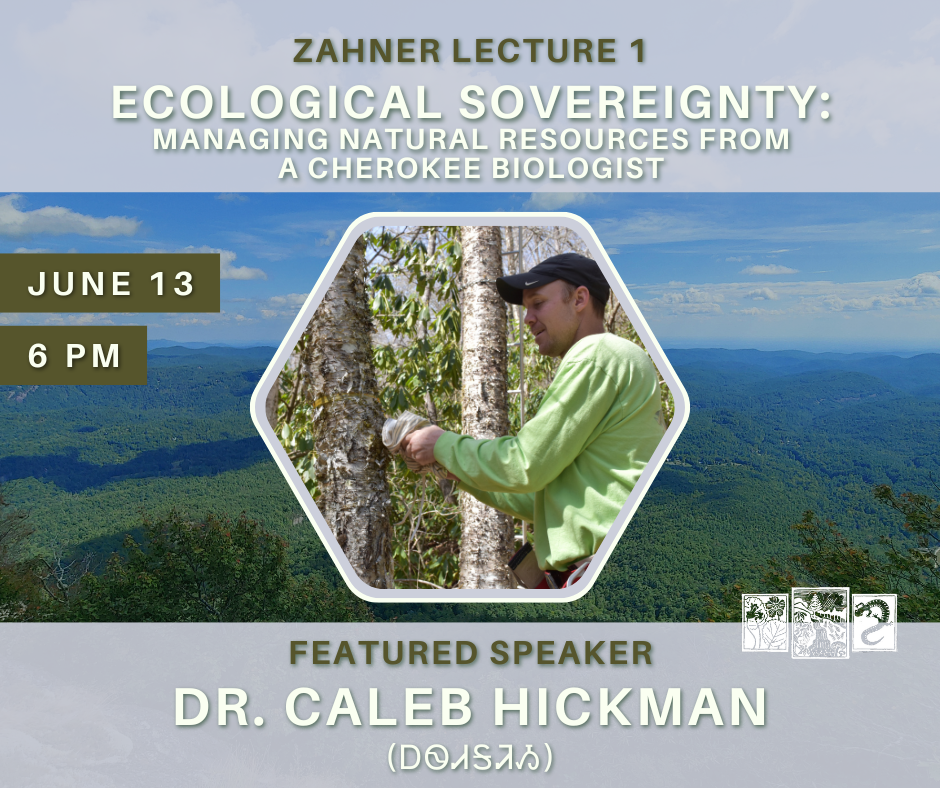
Lecture 1 - Ecological Sovereignty: Managing Natural Resources from a Cherokee Biologist
Featured Speaker: Dr. Caleb Hickman (ᎠᏫᏗᎦᏘᏱ), Supervisory Biologist, Eastern Band of Cherokee Indians
Date: Thursday, June 13th
Time: 6pm – 7pm
Cost: FREE
Sponsored by Ruthie & Berry Edwards and Lindy & Robbie Harrison.
Tribes are often looked at as a historical artifact of American history. However, with 574 federally recognized tribes, they persist still today as one of the largest land-holding management groups on the continent. These tribes have the same branches of government as the United States and independently manage natural resources under their own laws and regulations. As small sovereign nations that have a special relationship with the United States, Dr. Caleb Hickman argues that tribes are better equipped to lead conservation. They leverage their unique governance along with traditional knowledge to create a better future in the face of many challenges, such as climate change, invasive species, and endangered environments.
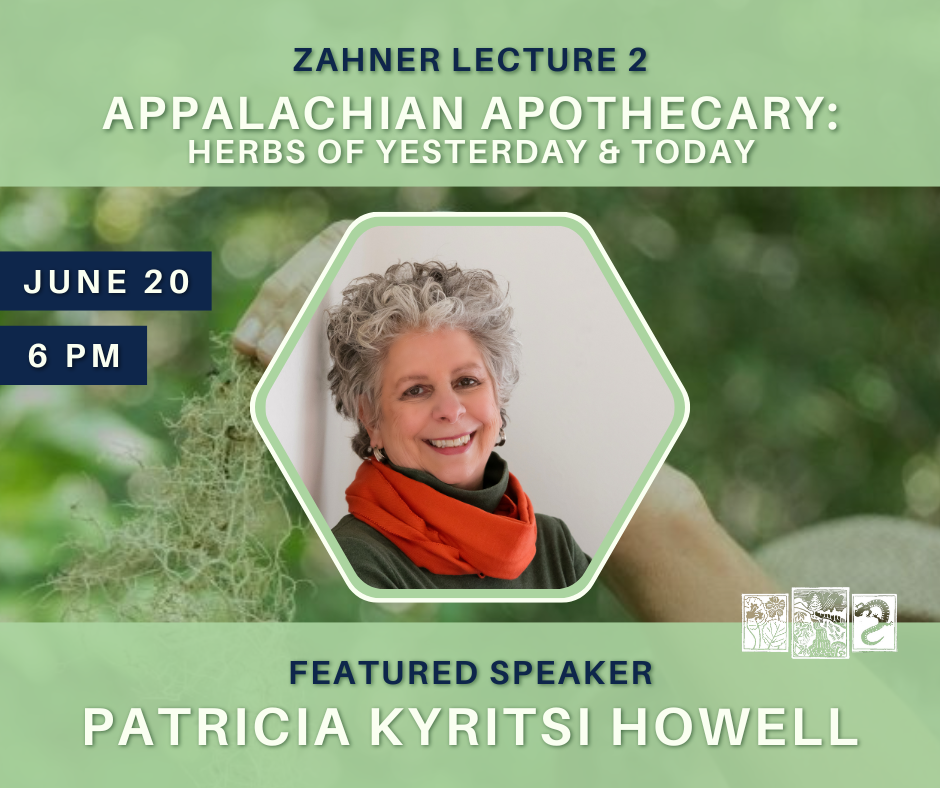
Lecture 2 - Appalachian Apothecary: Herbs of Yesterday and Today
Featured Speaker: Patricia Kyritsi Howell, Registered Herbalist (AHG), BotanoLogos School of Herbal Studies
Date: Thursday, June 20th
Time: 6pm – 7pm
Cost: FREE
Sponsored by Vicki & Donny Ferguson.
The Blue Ridge Mountains of the southern Appalachian Mountains are famous for their botanical diversity, which includes many plants with a long history of medicinal use by Indigenous peoples, enslaved Africans, and European colonizers. Even more remarkable is the fact that many of these plants still play an essential role in modern health care. Drawing from her years as a practicing herbalist, Patricia Kyritsi Howell shares stories about their historical uses and explains what recent research confirms about their healing properties. You’ll gain a deeper appreciation for the wildflowers and trees that grow all around us.
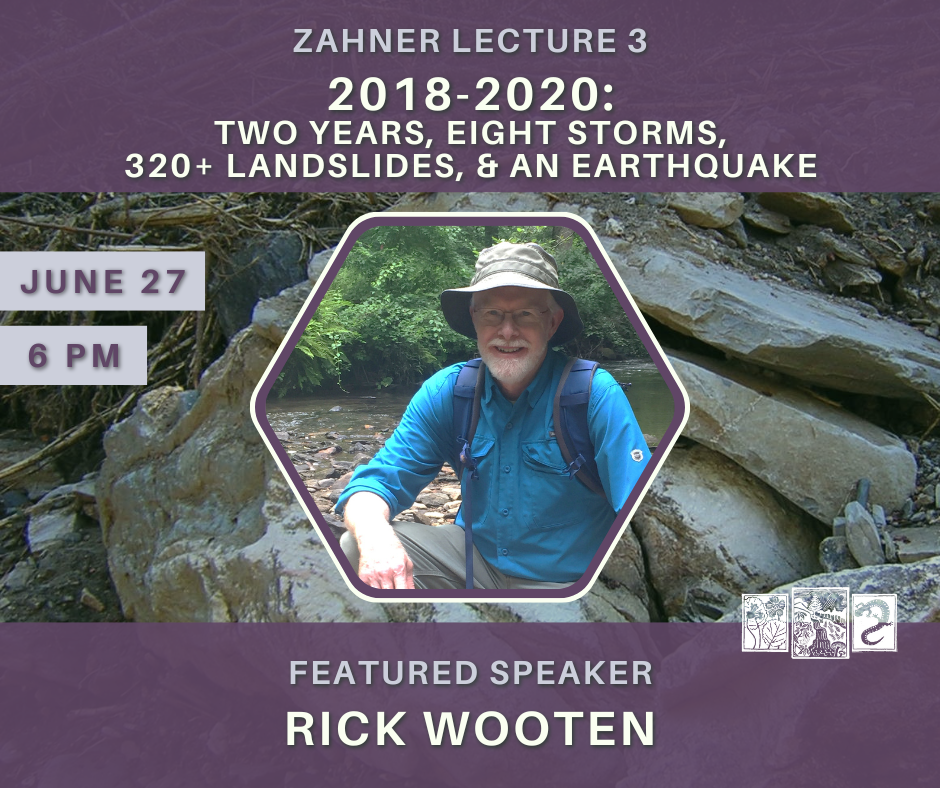
Lecture 3 - 2018-2020: Two Years, Eight Storms, 320+ landslides, and an Earthquake: What We Learned about the Connections Between Weather, Climate Change, Landforms and Geology
Featured Speaker: Rick Wooten, P.G., North Carolina Geological Survey (ret.)
Date: Thursday, June 27th
Time: 6pm – 7pm
Cost: FREE
Sponsored by Suzanne & Don Duggan, Julie Farrow & Charlie Shufeldt , Florence & Tom Holmes, Ruthie & Franko Oliver, Adele & Nick Scielzo, and Margaret Waters.
The Blue Ridge Mountains in western North Carolina experienced a surge in landslide frequency following a two-year period of above-normal rainfall that began in May 2018. A series of extreme rainfall events triggered over 320 fast-moving debris flows and reactivated large, slow-moving landslides that damaged private property and infrastructure. One notable event occurred on May 18, 2018, when convective storms in Polk County triggered over 240 damaging debris flows. Subsequent storms caused significant losses, including over $1 million in direct losses from debris flows in the Nantahala River Gorge on August 24, 2019. This series of events highlights the stabilizing role of healthy forests on mountain slopes and the increasing pattern of extreme weather associated with climate change. Following this period of heavy rainfall, the region experienced a magnitude 5.1 earthquake in Sparta on August 9, 2020, which revealed the first documented seismic fault breaking the ground surface in the eastern United States. The Little River Fault runs parallel to other geological features associated with prehistoric and recent landslide activity.

Lecture 4 - Landscape Meanders: Design Ideas for the South Gateway Garden at the Highlands Botanical Garden
Featured Speaker: Warren Byrd, Jr. FASLA; Professor Emeritus; University of Virginia & Founding Principal; Nelson Byrd Woltz Landscape Architects
Date: Thursday, July 11th
Time: 6pm – 7pm
Cost: FREE
Sponsored by Bryding Adams & Bob Rathburn, Lynda Anderson & Ken Conover, Margie Bauer & Jim Parker, Janet & Scott Clarke, Leslie & Jim Costa, Diane Lennox & Paul Manos, Helen & Russ Regnery, Liz Sargent, and Dollie Swanson.
In this talk, Warren Byrd will present preliminary design influences and concepts for a new entry garden adjacent to the Highlands Biological Station’s Nature Center. Working closely with the administration of the Station, its Board members, and a group from the Station’s Botanical Garden and Grounds Planning and Advisory Committee, landscape architects Warren Byrd, Susan Nelson, and Liz Sargent are helping to envision how a fully accessible and engaging “Discovery Garden” might be articulated as an outdoor complement to the existing Nature Center.
As a gateway, this is seen as an opportunity to interpret the interrelationship between the region’s plant and animal communities, and the hydrology and geology that are the foundation for how these communities evolved where they did. Warren will also present several other built landscape projects from NBW’s portfolio – designs that demonstrate how specific influences from a locale or region are successfully incorporated into the final landscape expression.
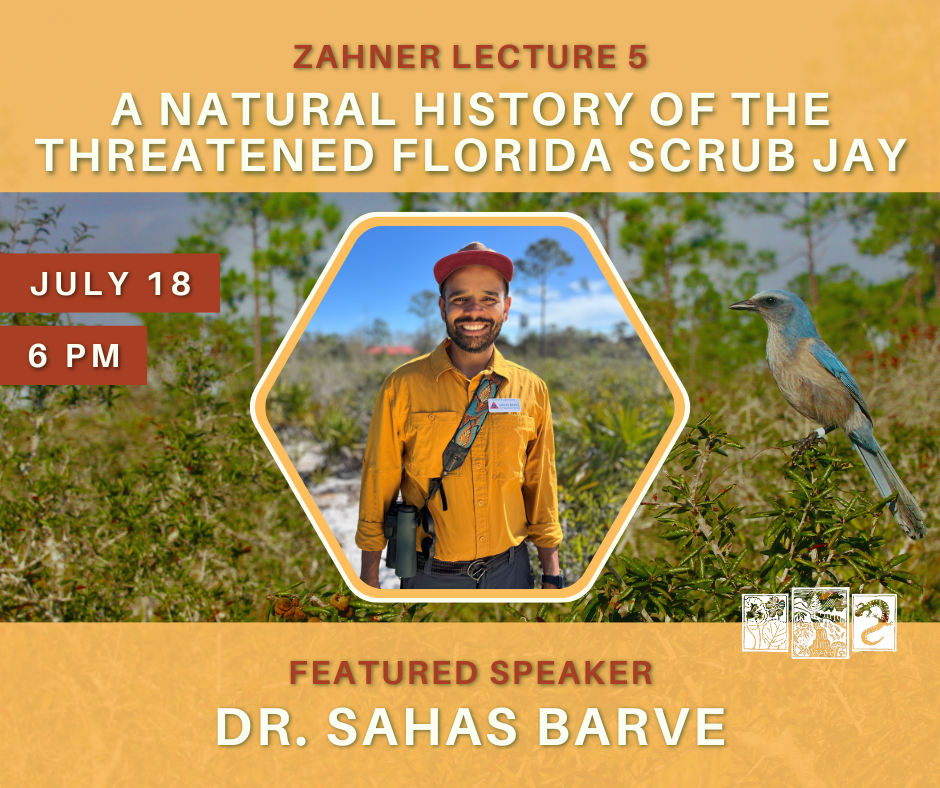
Lecture 5 - Fire, Acorns, and Kids that Stay with You Way Too Long: A Natural History of the Threatened Florida Scrub Jay
Featured Speaker: Dr. Sahas Barve, John W. Fitzpatrick Director of Avian Ecology, Archbold Biological Station
Date: Thursday, July 18th
Time: 6pm – 7pm
Cost: FREE
Sponsored by Jennie Stowers.
The Florida Scrub-Jay is a flagship of the unique upland oak scrub habitats of Florida. In this talk, Dr. Sahas Barve will explore the biology of this unique habitat, the interesting social lives of scrub-jays, and the threats that are facing this charismatic habitat specialist.

Lecture 6 - Climate-informed Forestry in the Southern Appalachians
Featured Speaker: Adam Warwick, Southern Blue Ridge Stewardship Manager, The Nature Conservancy
Date: Thursday, July 25th
Time: 6pm – 7pm
Cost: FREE
Sponsored by Martha & Michael Dupuis, Monte & Palmer Gaillard, and Melanie & Tom Mauldin.
In this talk, Adam Warwick will share his experience managing forests to be resilient to a changing climate within our region. The presentation will cover the ecological history of the southern Appalachians and how it has shaped the forests we see today. He will discuss what The Nature Conservancy is doing to ensure the health of our region’s exceptional biodiversity into the future.

Lecture 7 - The Surface Water and Ocean Topography Mission: NASA’s New Eye in the Sky for Earth’s Water
Featured Speaker: Dr. Tamlin Pavelsky; Professor of Earth, Marine, and Environmental Sciences; University of North Carolina
Date: Thursday, August 1st
Time: 6pm – 7pm
Cost: FREE
Sponsored by Kim & Rich Daugherty and Kathy & Bestor Ward.
After almost two decades of development, NASA launched the Surface Water and Ocean Topography (SWOT) Mission in December 2022. SWOT is designed to provide the most complete measurements ever of Earth’s surface water, including rivers, lakes, and oceans. It uses radar technology to track detailed variations in water levels that can help us understand water storage in millions of lakes, the flow of water through rivers, and ocean currents. In this talk, we will explore this exciting new mission and get a first look at some of the data and results that are beginning to come out from it.
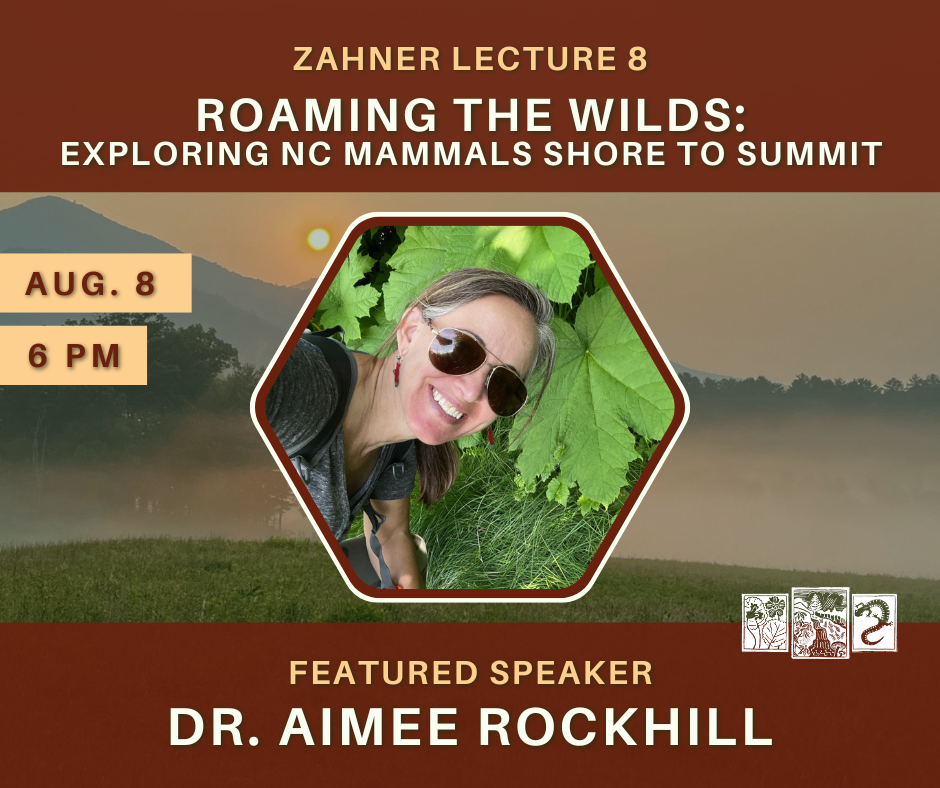
Lecture 8 - Roaming the Wilds: Exploring NC Mammals Shore to Summit
Featured Speakers: Dr. Aimee Rockhill, Associate Professor, Western Carolina University
Date: Thursday, August 8th
Time: 6pm – 7pm
Cost: FREE
Sponsored by Mary Todd & Jimmy Davis and Miriam & Vernon Skiles.
Mammals, those charismatic warm and fuzzies that roam our planet, play a crucial role in both conservation and management efforts. Herbivores help shape plant communities through browsing and grazing, and carnivores maintain ecological balance by maintaining prey populations. Likewise, most mammals aid in forest regeneration by facilitating seed dispersal, aerating our soils, and returning nutrients to the landscape. North Carolina is home to an estimated 126 mammal species; 79 of which roam the terrestrial landscape. In this presentation, Dr. Aimee Rockhill will delve into her research journey that spans the state of North Carolina, from the coast to the mountains. She’ll cover the basics of how researchers survey and monitor mammals, share some of her research discoveries, and discuss areas where additional inquiry is needed. Further, she will outline avenues for your involvement in supporting the dedicated mammologists across the state to enhance our understanding and fortify conservation efforts aimed at safeguarding these remarkable species.
